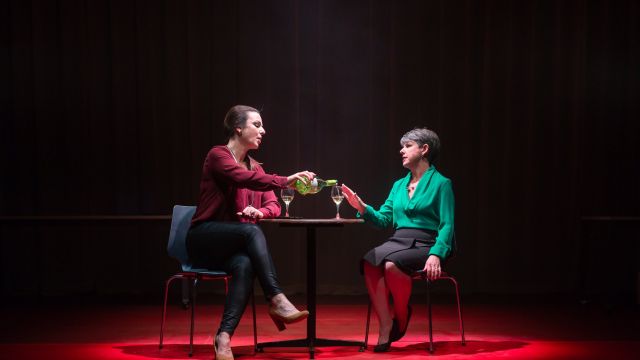Exclusion
“I prefer to call it marriage equality. We don’t get ‘gay married’, we just want to get married like everyone else,” to paraphrase Craig Morrow, the young out gay man at the centre of David Atfield’s Exclusion. In many ways that is an essential truth about this play: it’s not gay theatre, it’s theatre which happens to have a few gay characters. Of course, being same-sex attracted has affected the lives of some of these characters profoundly, and in different ways depending on when they came of age. The play illustrates varying experiences of queer men in three generations—millennials, generation x and baby boomers—and teases out the effects on their psyches and the choices they’ve made. Overlying that dynamic is the vicious backstabbing environment and competing egos of Parliament, and the moral quandaries and choices involved both with ambition and making legislation. The scandals surrounding Barnaby Joyce, Peter Slipper and an attempt to frame Justice Michael Kirby have clearly informed David Atfield’s script.
Craig Morrow (Ethan Gibson) is a handsome millennial who works as a media advisor. Morrow is competent, clever and decent but with a major flaw: that he is blinded by his love for his boss Jasper Ferrier (Craig Alexander). Ferrier is a politician who is as ambitious as he is lustful. Alexander’s Jasper makes his sexual desire for his wife Jacinta (Fi Hopkins) abundantly clear. He seems to be too much, too over the top, and we soon learn that this is to some extent cover for the fact that he’s having a fling with Craig, and it’s only when he’s with him that he lets his mask drop, just a little, to show what the real Jasper is like—which is not very nice. His wife Jacinta is also a beautifully drawn character—sensual, strong, ambitious, intelligent; she’s sacrificed everything she had to support Jasper’s career.
 Meanwhile, Michael Collins (Michael Sparks) is competing with Ferrier to become preferred next PM. Sparks plays Collins as a sweet older man, conflicted and decent, with a bewildered innocence to him. His wife Caroline (Tracy Bourne), is staunchly religious and repressed, carrying herself with enormous tension. She’s as dignified as she is controlled and repressed. Their basic decency has made them vulnerable to being set up politically by the monstrous Jasper.
Meanwhile, Michael Collins (Michael Sparks) is competing with Ferrier to become preferred next PM. Sparks plays Collins as a sweet older man, conflicted and decent, with a bewildered innocence to him. His wife Caroline (Tracy Bourne), is staunchly religious and repressed, carrying herself with enormous tension. She’s as dignified as she is controlled and repressed. Their basic decency has made them vulnerable to being set up politically by the monstrous Jasper.
Like Atfield’s previous play A Scandalous Boy there is stark full frontal nudity, but it is in the context of relationships as it would naturally occur so is not at all gratuitous. It gives the characters an extraordinary vulnerability and it serves to normalise every day events within relationships—again, not gay relationships, but relationships that happen to be gay. In spite of the political intrigue, the play ends on a surprisingly heartwarming note. There’s a great honesty to the production which comes from the matter-of-fact treatment of the characters’ intimacy, of which the nakedness and depictions of sex are a natural and important part. The sensitive handling of relationships makes this play quite beautiful. Recommended for those who like nuanced theatre and are open-minded enough to deal with the nudity.
Cathy Bannister
Photographer: Shelly Higgs.
Subscribe to our E-Newsletter, buy our latest print edition or find a Performing Arts book at Book Nook.

